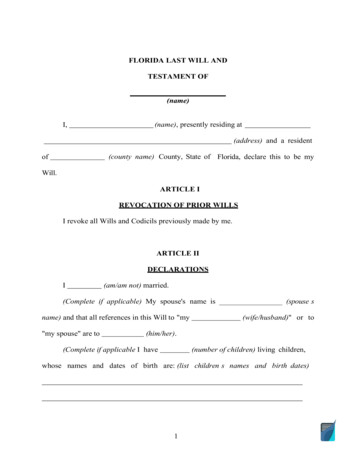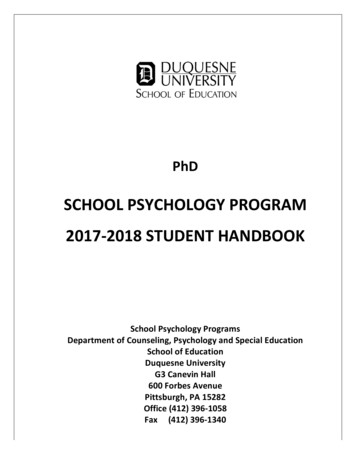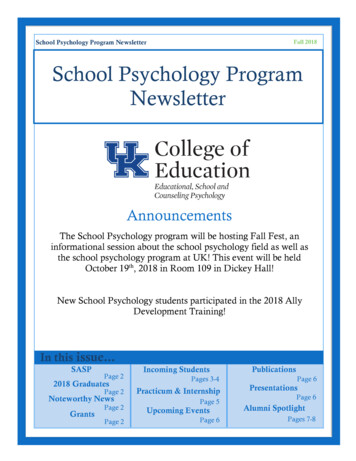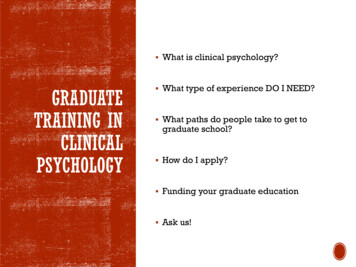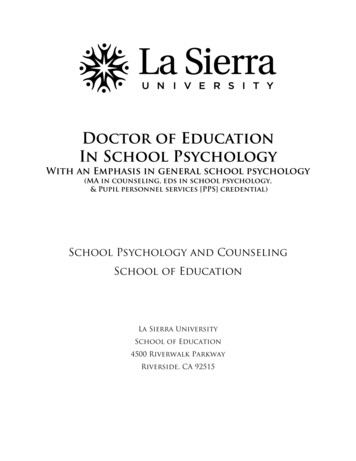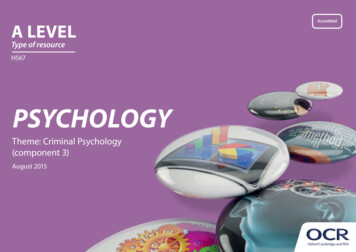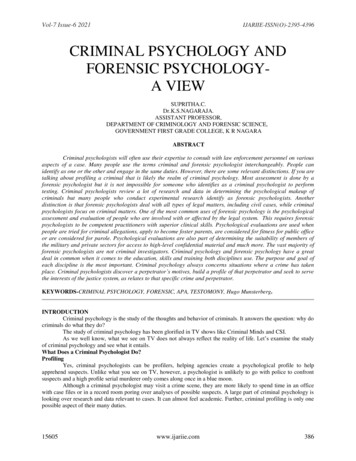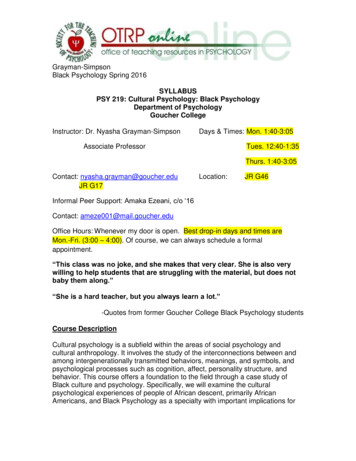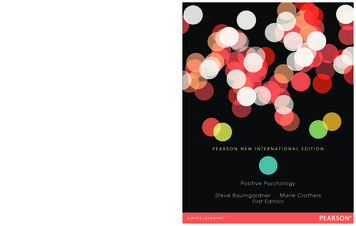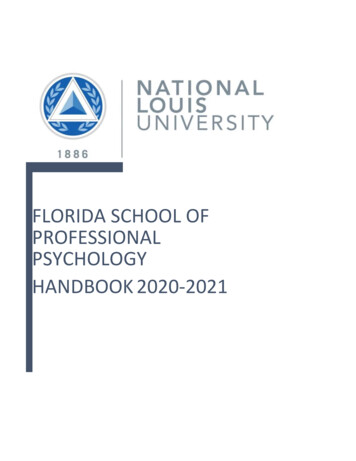
Transcription
FLORIDA SCHOOL OFPROFESSIONALPSYCHOLOGYHANDBOOK 2020-2021
FLORIDA SCHOOL OF PROFESSIONAL PSYCHOLOGY PSY.D. PROGRAM2020-2021PROGRAM DIRECTORDr. Crystal CollierCORE FACULTYDr. Kathie BatesDr. Christina BrownDr. Lisa CostasDr. Patricia DixonDr. Shari FabregasDr. Gary HowellDr. Elizabeth LaneADJUNCT FACULTYDr. Michelle BoscoDr. Sierra IwanickiDr. Marcia PitaDr. Eric RosenDr. Sophia ZavrouPROGRAM ADMINISTRATIVE ASSISTANTMs. Diana (Dee Dee) KirkCLINICAL ENROLLMENT & OUTREACH SPECIALISTMrs. Sara NoblesFSPP Student Handbook 1
TABLE OF CONTENTSPURPOSE OF THE HANDBOOK . 5PROGRAM INFORMATION . 5FSPP AIMSFSPP COMPETENCIESSTANDARDS OF PROFESSIONAL CONDUCTPSYD ADMISSIONS CRITERIA . 11FOUNDATION COURSES REQUIREDPSYD ADMISSIONS REQUIREMENTSADMISSION COMMITTEE DECISIONSTRANSFER OF COURSESPSYD PROGRAM REQUIREMENTS . 15PSYD CURRICULUMREQUIRED CORE COURSESELECTIVE REQUIREMENTAWARD OF MASTER’S DEGREERESIDENCY REQUIREMENTACADEMIC PROGRESS REQUIREMENTRETAKING COURSESWRITING PROGRAMPROGRAM CONCENTRATIONSPROFESSIONALIZATIN GROUP REQUIREMENTPRACTICUM AND PRACTICUM SEMINARSCLINICAL EQUIVALENCY COMPETENCY REQUIREMENTSCOMPREHENSIVE EXAMINATION REQUIREMENTCLINICAL RESEARCH PROJECT REQUIREMENTINTERNSHIP REQUIREMENTMACL PROGRAM DESCRIPTION . 30MACL ADMISSION CRITERIA . 31FSPP Student Handbook 2
FOUNDATION COURSES REQUIREDMACL ADMISSIONS REQUIREMENTSADMISSIONS COMMITTEE DECISIONSMACL REQUIREMENTS . 33PROFESSIONAL CONDUCTMA ACADEMIC PROGRESS REQUIREMENTSRETAKING COURSESPERFORMANCE EVALUATIONMACL CURRICULUMPROGRAM REQUIREMENTSCORE COURSES REQUIREMENTELECTIVES REQUIREMENTSPROFESSIONALIZATION GROUP REQUIREMENTPRACTICUM AND PRACTICUM SEMINARSCLINICAL EQUIVALENCY COMPETENCY REQUIREMENTTRANSFER OF COURSES to MACLTRANSFER/APPLICATION TO PSYD PROGRAMFSPP PROGRAM INFORMATION, POLICIES, AND PROCEDURES . 41PROFESSIONAL CONDUCTFACULTY ADVISINGSTUDENT PERFORMANCE EVALUATIONSCOURSE REGISTRATION, ATTENDANCE, AND LEAVESTUDENT LIABILITY INSURANCENLU STUDENT PORTALPERSONS REQUIRING ACCOMMODATIONSTEXTBOOKSCHANGE OF NAME/ADDRESSSTUDENT GOVERNANCE AND PROFESSIONAL ORGANIZATIONSFSPP POLICIES AND PROCEDURES . 53CLINICAL PRACTICE POLICYPOLICY ON USE OF VOLUNTEERSGUIDELINES FOR DISPOSAL OF CONFIDENTIAL MATERIALSFSPP Student Handbook 3
EQUIPMENT AND ASSESSMENTS CHECK-OUTSTUDENT PROFESSIONAL DEVELOPMENT COMMITTEE (SPDC)TEACHING ASSISTANTSHIPSNLU SUPPORTS FOR LEARNING . 57ACADEMIC HONESTY AND PLAGIARISMFINANCIAL AIDHELP DESK AND TECHNICAL USER SUPPORTD2LLIBRARY AND LEARNING SUPPORTEQUAL OPPORTUNITY/PERSONS WITH DISABILITIESFSPP PROGRAM CORE FACULTY. 59APPENDICES . 64PROGRAM FORMSETHICAL PRINCIPLES OF PSYCHOLOGY AND CODE OF CONDUCTFSPP Student Handbook 4
PURPOSE OF HANDBOOKThis program student handbook describes the components of the Florida School of ProfessionalPsychology (FSPP) Clinical Psychology doctoral (Psy.D.) and master’s programs (MACL) in clinicalpsychology at National Louis University (NLU)-Tampa Regional Campus. This handbook includesprogram aims and goals, competencies, coursework requirements, general information aboutpracticum and internship policies and practices, student evaluation, advising, and a number of degreeand program procedural requirements and timelines. Please be advised that information, procedures,and rules described in this handbook can be subject to change by NLU or FSPP. FSPP will periodicallyreview its policies and procedures in order to serve the needs of the University and the Program andto respond to mandates of other regulatory and crediting agencies. Florida School of Professional atNational Louis University reserves the right to change, rescind, or include additional regulations,policies and procedures in the FSPP Student Handbook. Whenever possible, advance notice isprovided of any changes. However, changes may occur without notice. Therefore, students are referredto the NLU Graduate Catalog and the Student Guidebook online for updates as well as to FSPP’sClinical Training Manual and the Clinical Research Project (CRP) Manual for other updates.The policies and procedures that appear in this Student Handbook do not constitute a contractbetween the University and any student or any other person.ABOUT THE FLORIDA SCHOOL OF PROFESSIONAL PSYCHOLOGYThe Florida School of Professional Psychology at National Louis University- Tampa offers thedoctoral degree in clinical psychology (Psy.D.) and master’s degree in clinical psychology (MACL).Our programs follow the practitioner-scholar model of clinical training, which prepares aspiringpsychologists to develop the essential knowledge, skills and attitudes required for successful clinicalpractice.FSPP is now part of National Louis University (NLU) and its College of Psychology andBehavioral Sciences. NLU is a nonprofit, private, diverse institution with a rich educational historydating for over 100 years. NLU is accredited by the Commission on Institutions of Higher Educationof the North Central Association of Colleges and Schools, 30 N. LaSalle St., Suite 2400, Chicago,Illinois 60606 (312-263-0456). NLU was founded over 100 years ago in 1886, when ElizabethHarrison founded the school to train "Kindergarteners," young women teachers who began the earlychildhood education movement. The school's requirements became a model for education collegesnationwide. The university's name was changed to the Chicago Kindergarten Training School (1887),FSPP Student Handbook 5
Chicago Kindergarten College (1893), the National Kindergarten and Elementary College (1912) andthen the National College of Education (1930). The university championed the concept of kindergartenand early education teaching in America and was one of the first teachers' colleges in the country tooffer a four-year program culminating in the bachelor of education degree. In the 1920s, the universitypartnered with Nobel Peace Prize recipient Jane Addams to provide educational opportunities to thepoor, immigrant population served by Hull House. In 1990, NLU united the name of National Collegeof Education with that of trustee and benefactor Michael W. Louis.NLU is regionally accredited by the Higher Learning Commission (HLC), one of six regionalinstitutional accreditors recognized by the United States Department of Education and the Council forHigher Education Accreditation. Currently, NLU is on the Standard Pathway to regional accreditation,which follows a 10-year cycle and is focused on quality assurance and institutional improvement. Formore information about regional accreditation, visit the institutional accreditation website.FSPP is currently under the name National Louis University, Tampa /Argosy Teach-Out is'accredited, inactive' by the Commission on Accreditation of the APA. This accreditation statusdesignates an accredited program that is no longer admitting students. This status was granted toaccommodate teach-out students from Argosy University. Persons who were not enrolled in accreditedArgosy programs are not to be admitted to the National Louis University, Tampa /Argosy Teach-out'accredited, inactive' program. FSPP, however, is currently seeking active accreditation after relocatingto NLU on April, 2019. FSPP had been fully accredited by the APA since 2002 until its relocation toNLU due to the closure of FSPP’s previous campus, Argosy University, in March, 2019.PSY.D. PROGRAM DESCRIPTIONThe primary purpose of the Psy.D. in Clinical Psychology degree program is to educate and trainstudents in the major aspects of clinical practice. To help ensure that students are prepared adequately,the curriculum integrates theory, training, research, and practice, preparing students to work with awide range of populations in need of psychological services and in a broad range of roles.The Psy.D. in Clinical Psychology degree program combines relevant research, applied theory,and field experience and is designed to prepare the graduate to apply psychological knowledge in avariety of settings and roles.In addition to the prescribed coursework, the required curriculum for all students includespracticum field experiences and an internship. To complete the doctoral program successfully, studentsmust demonstrate competency in a number of specific foundational, clinical, conceptual, andFSPP Student Handbook 6
professional skills.Graduates are trained in the science and practice of psychology and are able to apply the clinicalskills of observation, assessment, intervention, and evaluation to help different segments of our everchanging society. The areas of competency are modeled, in part, after those specified by the NationalCouncil of Schools and Programs of Professional Psychology and the standards of the AmericanPsychological Association (APA). Completing the clinical psychology program indicates that therecipient has mastered the fundamental academic and experiential elements of clinical psychology.PROGRAM LEARNING OUTCOMESSpecific Program Learning Outcomes of the Psy.D. program include the following:1.Students will demonstrate the ability to select and deliver effective diagnostic andtherapeutic interventions to diverse populations.2.Students will understand and apply the biological, psychological and social bases andtheories of human functioning.3.Students will be able to evaluate and use the existing and evolving body of knowledge andmethods in the practice and science of psychology.4.Students will be able to demonstrate effective group leadership skills in health care or anyorganizational setting.FSPP AimsThe Florida School of Professional Psychology at National Louis University’s clinicalpsychology doctoral program’s aim is to educate and train students employing a practitioner-scholarmodel to enable them to function effectively as clinical psychologists. To ensure that students areadequately prepared, the curriculum is designed to provide for the meaningful integration of thescience of psychology, clinical practice, and professional development in a fully on-ground format.The clinical psychology program at the FSPP is designed to emphasize the development of knowledge,skills, and attitudes essential in the development of health service psychologists whose theoretical,empirical, and practical foundations enable them to meet the challenges of diverse settings,populations, and communities. Considerable focus is also given to the ethical and professionalparameters of practice.FSPP CompetenciesThe Florida School of Professional Psychology at National Louis University’ clinical psychologydoctoral program subscribes to the APA Standards of Accreditation. As such, students are expected toFSPP Student Handbook 7
establish an identity in and orientation to health service psychology by acquiring the necessarydiscipline-specific knowledge and profession-wide competencies as follows:Competency One: Students will demonstrate competency in (i) the application of research andstatistical methods in psychology to generate knowledge and to evaluate the effectiveness of researchmethods, and (ii) in the understanding of psychometric science principles and the utilization of suchknowledge in psychometric testing. Students will demonstrate knowledge and application of researchmethods.a.Students will demonstrate knowledge and application of quantitative/ qualitative methods.b.Students will demonstrate knowledge and application of psychometrics.c.Students will demonstrate the ability to independently formulate, conduct, and disseminatescholarship.Competency Two: Students will understand and apply ethical principles and professionalstandards that guide the practice of clinical psychology.a.Students will demonstrate knowledge and application of the current APA Code of Ethicsand the general ethical principles and standards that serve as the foundation for this code.b.Students will demonstrate knowledge and application of a model of ethical decision-making to resolve ethical issues or dilemmas.c.Students will demonstrate knowledge and application of the general professionalparameters that govern professional practice.Competency Three: Students will demonstrate competency in individual and culturaldiversity by demonstrating knowledge of the major theoretical models and empirical findings and willapply knowledge about human diversity to clinical practice.a.Students will demonstrate knowledge of the major theoretical models and empiricalfindings, including an awareness of social, political, economic, and cultural factors that impactindividuals, institutions, systems, and communities.b.Students will demonstrate an awareness of their own personal values, biases, and culturalidentities that inform perceptions of self, other, and engagement with others.c.Students will utilize cross-cultural skills and appropriate APA multicultural guidelines toprovide services to persons with diverse cultural values and lifestyles.Competency Four: Students will demonstrate knowledge of the requisite values, attitudes, andbehaviors that exemplify their identities as professional psychologists.FSPP Student Handbook 8
a.Students will demonstrate self-reflection, self-awareness, and openness to supervision andfeedback.b.Students will demonstrate engagement in life-long learning by attending educational andprofessional meetings, life-long learning events, subscribing to professional journals, or presentingscholarly work.Competency Five: Students will demonstrate effective communication competencies andinterpersonal skills.a.Students will demonstrate clear, articulate, and integrative written communication skills.Students will demonstrate clear, articulate, and integrative oral communication skills.b.Students will demonstrate effective interpersonal skills in professional interactions.Competency Six: Students will demonstrate competency in using assessment instruments andincorporating knowledge of psychopathology in the assessment process.a.Students will demonstrate competency in selecting, administering, scoring, interpreting,and reporting psychological tests and measures.b.Students will demonstrate competency in integrating interview data, psychological testingresults, behavioral observations, and information from other sources to formulate an understanding ofpresenting concerns and to make recommendations.c.Students will demonstrate competency in identifying relevant DSM criteria and utilizingother clinical information to generate diagnostic formulations.d.Students will demonstrate competency in applying knowledge of psychopathology to caseformulation and treatment planning.Competency Seven: Students will demonstrate competency in clinical interventions that aregrounded in conceptual models of treatment and evidence-based practices.a.Students will demonstrate knowledge of and skill in applying evidence-based clinicalpractices.b.Students will demonstrate an ability to establish and maintain an effective workingrelationship and/or treatment alliance with clients served.c.Students will demonstrate knowledge and competency in evaluating the effectiveness ofinterventions.Competency Eight: Students will demonstrate knowledge of the models and processes ofsupervision.FSPP Student Handbook 9
a. Students will evidence knowledge of supervision models and practices.Competency Nine: Students will demonstrate knowledge of consultation models and practicesand demonstrate interprofessional/interdisciplinary skills.a.Students will evidence knowledge of consultation models and the role of a consultant.b.Students will demonstrate competency in applying consultation practices―assessment andintervention―to specific referral questions from other professionals.Competency Ten: Students will demonstrate foundational knowledge underlying the scienceof psychology in the following areas: biological, cognitive-affective, and social bases of humanbehavior; and lifespan development and history and systems of psychology.Competency Eleven: Students will demonstrate advanced skills in integrating knowledgederived from the foundations of scientific psychology.Standards of Professional ConductAs noted above, students in the Psy.D. program are expected to learn appropriate standards ofprofessional conduct for clinical psychologists – and to abide by these standards as they proceedthrough the program. The program competency statement denotes expectations for studentprofessionalism as a trainee in the Psy.D. program (see V. Communications and Interpersonal Skillsand IV. Professional Values, Attitudes and Behaviors competencies above). Also, the Council ofChairs of Training Councils (CCTC; 2004) developed a framework that has been adopted by FSPP asa basic standard by which professional conduct will be evaluated. These general expectations ofstudent professional conduct are outlined below as a nonacademic policy: Interpersonal and professional competence, including: Respectful peer and faculty interactions Respect for the ideas and integrity of others Maturity in interactions with others Ability to respectfully interact with people of diverse backgrounds Ability to react with appropriate empathy and sensitivityo Self-awareness, self-reflection, and self-evaluation, including: Ability to formulate and express observations/impressionsInterpersonal interactions which provide evidence that the student understands how his/herbehavior affects relationships with othersFSPP Student Handbook 10
Openness to process of supervision, including: Uses professional language to communicate even when agitated, uses the appropriate chainof command, etc. Subsequent clinical work samples and/or interpersonal interactions reveal evidence thatstudent has understood and applied supervisory feedback Resolution of problems or issues that interfere with professional development or functioningin a satisfactory manner, including: Ability to respond constructively to feedback from supervisors or program faculty withminimal defensiveness Is able to acknowledge own role in creating problems, such as contributions to orexacerbation of a situation Offers appropriate responses, given a situation Ability to act constructively to prevent and resolve issues and openness to solutions proposedby others Tolerance for the shortcomings and mistakes of othersThe Florida School of Professional Psychology at National Louis University has a strongcommitment to training practitioners who demonstrate high levels of professionalism and clinical skill.It is a fundamental requirement of the Florida School of Professional Psychology at National LouisUniversity that all students meet the standards of the profession of psychology. One aspect of thatexpectation requires that all students adhere to the principles of the American PsychologicalAssociation 2010 Ethical principles of Psychologists and Code of Conduct. Not only will students berequired to complete academic and clinical requirements, but they will be expected to conductthemselves in a manner consistent with the profession of psychology at all times. Professional conductincludes respectful interpersonal relationships with all individuals. Any activities that appear to violatethe University’s principles of professional standards in the course of the student’s education or trainingwill be referred to and reviewed carefully by the appropriate faculty committee.PSY.D. ADMISSIONS CRITERIAFoundation Course RequirementsThe Florida School of Professional Psychology at National Louis University requires applicantsto successfully complete, with a “B” or better, five undergraduate courses that serve as a basicfoundation for course work in clinical psychology. Several of these courses serve as direct prerequisitesFSPP Student Handbook 11
to FSPP courses. The following three courses are required: Introduction to psychology or general psychology* Abnormal, psychopathology, or maladaptive behavior Statistics or research methodsTwo additional courses in field of psychology must also be completed.Students must complete foundation courses before they matriculate in the Psy.D. in ClinicalPsychology degree program.* This course may be waived if the applicant has completed a Bachelors or Master’s degree inPsychology or related mental health field.Psy.D. Admission RequirementsTo apply to the Psy.D. in Clinical Psychology degree program, applicants must have: A bachelor’s degree from a regionally accredited institution or an appropriately certifiedforeign institutionoGraduate applicants with a baccalaureate degree or college coursework from aninstitution outside the U.S. are required to have their undergraduate transcripts evaluated by an one ofNLU's approved foreign credential evaluation agencies verifying degree equivalence to a U.S.regionally accredited baccalaureate degree An undergraduate degree grade point average of at least 3.0 (on a scale of 4.0) -or- a conferredgraduate degree grade point average of 3.25 (on a scale of 4.0) * A minimum score on a pre-approved English language proficiency test is required for allapplicants whose native language is not English or who have not graduated from an institution at whichEnglish is the language of instruction as specified in the admission policies, English LanguageProficiency. Completion of an interview with members of the program admissions committee (by invitationonly)*For Psy.D. Admissions, an undergraduate degree grade point average of at least 3.0 (on a scaleof 4.0) or a conferred graduate degree grade point average of 3.25 (on a scale of 4.0). All applicantsare automatically admitted to both degrees if admission criteria are met and acceptance by the ProgramAdmission’s Committee is granted. Undergraduate students who apply for the Psy.D. degree, canchoose to be considered for acceptance into the M.A. program if not granted acceptance into the Psy.D.FSPP Student Handbook 12
program. Those students who are offered admittance into the M.A. program in place of the Psy.D.program can re-apply for the Psy.D. program during year two of the M.A. program.All applications for admission must be submitted to the admissions department. The clinicalpsychology enrollment specialist is available to help interested applicants complete the followingrequired documentation: Completed application for admission form, submitted via PSYCAS Personal/professional goal statement with a self-appraisal of qualifications for the profession Current résumé (or career summary) Three recommendation letters* Official transcripts from all post-secondary schools attended*A minimum of three professional letters of recommendation, addressing topics/questions asestablished and periodically revised by the faculty. Letters of recommendation must be written byindividuals who know the candidate from an academic or professional perspective and are able tocomment on the candidate’s capacity for undertaking graduate studies.Admissions Committee DecisionsAll applicants will receive written notification of the Admissions Committee’s decision.Admissions Committee decisions are final and not subject to appeal. Accepted applicants are requiredto remit a non-refundable deposit of 200.00 by the date stipulated on the written notification to reservea place in the entering class. This deposit will be applied toward the tuition of the student’s firstsemester. An applicant, if rejected, can reapply by following the reapplication policy. * As per NLUpolicy, admission and re-admission decisions are specifically excluded from the Academic Appealspolicy. The decision to deny admission cannot be appealed (see NLU Academic Catalog).*Applicants may reapply one year from their original application date. The clinical psychologyenrollment specialist is available to help interested applicants complete the reapplication process.Diverse Student Recruitment and Retention PlanFSPP values diversity in student identity, perspective, and experience. Just as the program isintentional with integrating aspects of diversity in its competencies and curriculum, the program strivesto build an intentionally diverse student body. Appendix B presents information about the program'sefforts to recruit and retain diverse students.Transfer of Courses/Credit to the Psy.D. programStudents may seek transfer credit for graduate coursework taken at other institutions only afterFSPP Student Handbook 13
enrolling at the Florida School of Professional Psychology at National Louis University and onlyduring the first year of enrollment. Students must complete a Transfer Request Form and supply thesyllabus, transcript, and any other relevant material for faculty review. Courses that overlap 80 percentwith FSPP courses may be accepted for transfer credit. A maximum of 30 credit hours may betransferred and applied to the Psy.D. in Clinical Psychology degree program. Students are advised,however, that only under unusual circumstances would more than one or two courses be transferred.Although additional requirements may apply, NLU policies for transfer credit for graduate ansfer-Credit) indicate the following criteria must be met: The student must have received a grade of “B” or better in the course. If the student has receivedany type of grade other than a traditional letter grade, a letter is required from the Registrar of theinstitution where the course was taken verifying that the grade is equivalent to at least a “B” (3.0 on ascale of 4.0) Courses must have been completed prior to admission to the Florida School of ProfessionalPsychology at National Louis University. Earned within the five years of matriculation in the clinical psychology programs. The program does not accept for transfer any credit hours earned as military credit, credithours by examination, credit hours by correspondence, credit hours for life experience, or graduatecredit hours from non-accredited institution. Credit must be from a regionally accredited institution. The course must not have been used toward completion of another degree. Transfer credit from institutions outside the United States must be submitted to an approvedoutside agency for evaluation. These agencies translate and interpret the transcript according toAmerican university standards. The official foreign transcript evaluation must be submitted to theOffice of Admissions and Records for processing. The number of credit hours that may be transferred is determined on an individual basis No transfer is automatic. Transfer of graduate credit varies by college and program and must be approved by Office ofthe Registrar and the program director or faculty. The Office of the Registrar must also have on file anofficial transcript reflecting the credit to be transferred. Transfer of credit hours will not be considered for courses completed elsewhere after admissionFSPP Student Handbook 14
to the Florida School of Professional Psychology at National Louis University.Petition for Course Transfer Forms are available from the Graduate Academic Advisor andshould be submitted to the chair of the Program Curriculum Committee. A student must complete oneform for each course for which transfer consideration is requested. When completing a Petition forCourse Transfer Form, a student should attach documentation that will facilitate a determination as towhether the submitted course is consistent with a course required in the clinical program.The following is a list of courses that are not considered eligible for transfer:Non-Transferable Courses PSYD710 - Professional Issues: Ethics, Conduct, and Law (3) PSYD711 - Professionalization Group I (1) PSYD712 - Professionalization Group II (1) PSYD736 - Clinical Interviewing (3) PSYD737 - Cognitive Assessment (3) PSYD771 - Objective Personality Assessment (3) PSYD772 - Projective Personality Assessment (3) PSYD773 - Integrative Assessment (3) PSYD838 - Interventions I (3) PSYD839 - Interventions II (3) PSYD801 - Integrative Approaches to Therapy (3) PSYD820 - Diagnostic Practicum and Seminar I (3) PSYD821 - Diagnostic Practicum and Seminar II (3) PSYD823 - Intervention Practicum and Seminar I (3) PSYD824 - Intervention Practicum and Seminar II (3)Note:Students who transfer from another National Louis University campus may have non- practicumcourses transferred at the discretion of the Program Curriculum and Training Committee.PSY.D. PROGRAM REQUIREMENTSPsy.D. CurriculumBelow is the current curriculum for the Psy.D. in Clinical Psychology program effectiveimmediately for current and prospective students in the program. Required/core courses, electivecourses, and credit hour breakdown are provided.FSPP Student Handbook 15
To be eligible for graduation, students must meet the following requirements: Successful completion of 98 credit hours, including practicum and concentration hours (ifstudent chooses to complete a concentration) Successful completion of the Capstone Sequence:o Comprehensive Clinical Examination- Diagnostic (CCE-D)o Comprehensive Clinical Examination- Psychotherapy (CCE-I)o Comprehensive Scientific Examination (Comps) Successf
Argosy programs are not to be admitted to the National Louis University, Tampa /Argosy Teach-out 'accredited, inactive' program. FSPP, however, is currently seeking active accreditation after relocating . Argosy University, in March, 2019. PSY.D. PROGRAM DESCRIPTION The primary purpose of the Psy.D. in Clinical Psychology degree program is to .
